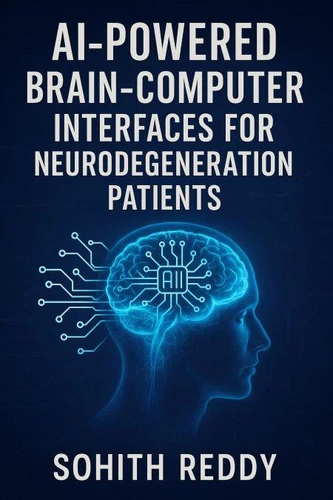Nouveauté
AI-Powered Brain-Computer Interfaces for Neurodegeneration Patients
Par :Formats :
Disponible dans votre compte client Decitre ou Furet du Nord dès validation de votre commande. Le format ePub est :
- Compatible avec une lecture sur My Vivlio (smartphone, tablette, ordinateur)
- Compatible avec une lecture sur liseuses Vivlio
- Pour les liseuses autres que Vivlio, vous devez utiliser le logiciel Adobe Digital Edition. Non compatible avec la lecture sur les liseuses Kindle, Remarkable et Sony
 , qui est-ce ?
, qui est-ce ?Notre partenaire de plateforme de lecture numérique où vous retrouverez l'ensemble de vos ebooks gratuitement
Pour en savoir plus sur nos ebooks, consultez notre aide en ligne ici
- FormatePub
- ISBN8231128259
- EAN9798231128259
- Date de parution16/07/2025
- Protection num.pas de protection
- Infos supplémentairesepub
- ÉditeurWalzone Press
Résumé
AI-Powered Brain-Computer Interfaces for Neurodegeneration Patients is a book born from both curiosity and compassion. It looks at how we can use modern technology - especially artificial intelligence - to support people living with neurodegenerative disorders like ALS, Parkinson's disease, and others that slowly take away movement, speech, and independence. At its core, this book is about giving people back some control.
It explores how brain-computer interfaces (BCIs) can help patients communicate, move, and interact with the world using just their brain signals - and how AI makes these systems smarter, faster, and more adaptable to each person's needs. Across fifteen chapters, the book walks you through everything from understanding how these diseases affect the brain, to how we collect and process brain signals, and how AI turns those signals into actions - whether it's moving a wheelchair, typing a message, or switching on a light.
It also looks at the emotional, ethical, and practical sides of building such life-changing systems. This book is written for anyone who wants to understand the real potential of AI in healthcare - not just as a buzzword, but as a meaningful tool to improve lives. Whether you're a student, researcher, caregiver, or just someone curious about the future of neurotechnology, this book is for you.
It explores how brain-computer interfaces (BCIs) can help patients communicate, move, and interact with the world using just their brain signals - and how AI makes these systems smarter, faster, and more adaptable to each person's needs. Across fifteen chapters, the book walks you through everything from understanding how these diseases affect the brain, to how we collect and process brain signals, and how AI turns those signals into actions - whether it's moving a wheelchair, typing a message, or switching on a light.
It also looks at the emotional, ethical, and practical sides of building such life-changing systems. This book is written for anyone who wants to understand the real potential of AI in healthcare - not just as a buzzword, but as a meaningful tool to improve lives. Whether you're a student, researcher, caregiver, or just someone curious about the future of neurotechnology, this book is for you.
AI-Powered Brain-Computer Interfaces for Neurodegeneration Patients is a book born from both curiosity and compassion. It looks at how we can use modern technology - especially artificial intelligence - to support people living with neurodegenerative disorders like ALS, Parkinson's disease, and others that slowly take away movement, speech, and independence. At its core, this book is about giving people back some control.
It explores how brain-computer interfaces (BCIs) can help patients communicate, move, and interact with the world using just their brain signals - and how AI makes these systems smarter, faster, and more adaptable to each person's needs. Across fifteen chapters, the book walks you through everything from understanding how these diseases affect the brain, to how we collect and process brain signals, and how AI turns those signals into actions - whether it's moving a wheelchair, typing a message, or switching on a light.
It also looks at the emotional, ethical, and practical sides of building such life-changing systems. This book is written for anyone who wants to understand the real potential of AI in healthcare - not just as a buzzword, but as a meaningful tool to improve lives. Whether you're a student, researcher, caregiver, or just someone curious about the future of neurotechnology, this book is for you.
It explores how brain-computer interfaces (BCIs) can help patients communicate, move, and interact with the world using just their brain signals - and how AI makes these systems smarter, faster, and more adaptable to each person's needs. Across fifteen chapters, the book walks you through everything from understanding how these diseases affect the brain, to how we collect and process brain signals, and how AI turns those signals into actions - whether it's moving a wheelchair, typing a message, or switching on a light.
It also looks at the emotional, ethical, and practical sides of building such life-changing systems. This book is written for anyone who wants to understand the real potential of AI in healthcare - not just as a buzzword, but as a meaningful tool to improve lives. Whether you're a student, researcher, caregiver, or just someone curious about the future of neurotechnology, this book is for you.



